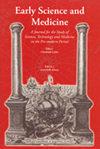欧亚大陆与恩克拉提亚:希腊-罗马融合理论与美德之争
IF 0.5
2区 哲学
Q3 HISTORY & PHILOSOPHY OF SCIENCE
引用次数: 0
摘要
许多古代哲学家对道德的发展和美德的获得是否受到人体物质构成的影响表现出浓厚的兴趣。道德教育和社会化被认为对由此产生的行为有重大影响,而个人本性,由于其特殊的生理特征,经常被视为与后天特征不断相互作用,最终决定个人性格。本文主要关注这一更广泛主题的两个关键概念,krasis(混合)和enkrateia(自制),并试图追溯它们在古希腊和古罗马时期的哲学相互关系,特别是从公元前5世纪到公元1世纪。这一分析的一个重要结果表明,在这一时期,enkrateia被描述为krasis的一种表现,通常是明确的,意味着它是某些“成分”的平衡混合。本文章由计算机程序翻译,如有差异,请以英文原文为准。
Eukrasia and Enkrateia: Greco-Roman Theories of Blending and the Struggle for Virtue
A number of ancient philosophers showed a keen interest in understanding whether moral development and the acquisition of virtue is in any way affected by the material constitution of human bodies. Moral education and socialisation were conceived of as having a significant impact on the resulting behaviours, while individual natures, thanks to their special physiological characteristics, were frequently seen as constantly interacting with acquired traits, eventually determining individual characters. This paper focuses on two key concepts of this wider subject, krasis (blending) and enkrateia (continence), and attempts to trace their philosophical interrelations throughout Greek and Roman Antiquity, especially from the fifth century BCE to the first century CE . An important result of this analysis reveals that during this period, enkrateia is described – often explicitly – as a manifestation of krasis , signifying as it does a well-balanced blending of certain ‘ingredients’.
求助全文
通过发布文献求助,成功后即可免费获取论文全文。
去求助
来源期刊

Early Science and Medicine
HISTORY & PHILOSOPHY OF SCIENCE-
CiteScore
0.50
自引率
0.00%
发文量
22
审稿时长
>12 weeks
期刊介绍:
Early Science and Medicine (ESM) is a peer-reviewed international journal dedicated to the history of science, medicine and technology from the earliest times through to the end of the eighteenth century. The need to treat in a single journal all aspects of scientific activity and thought to the eighteenth century is due to two factors: to the continued importance of ancient sources throughout the Middle Ages and the early modern period, and to the comparably low degree of specialization and the high degree of disciplinary interdependence characterizing the period before the professionalization of science.
 求助内容:
求助内容: 应助结果提醒方式:
应助结果提醒方式:


